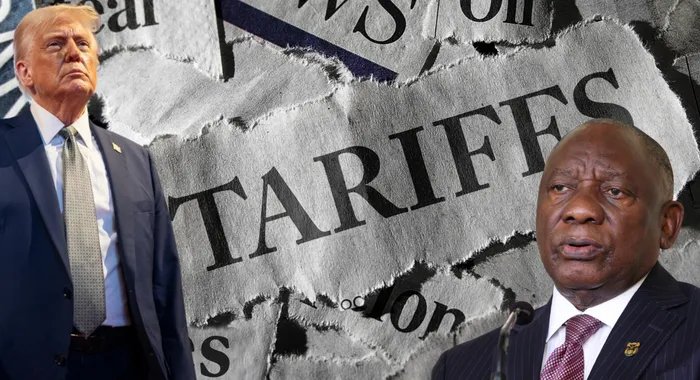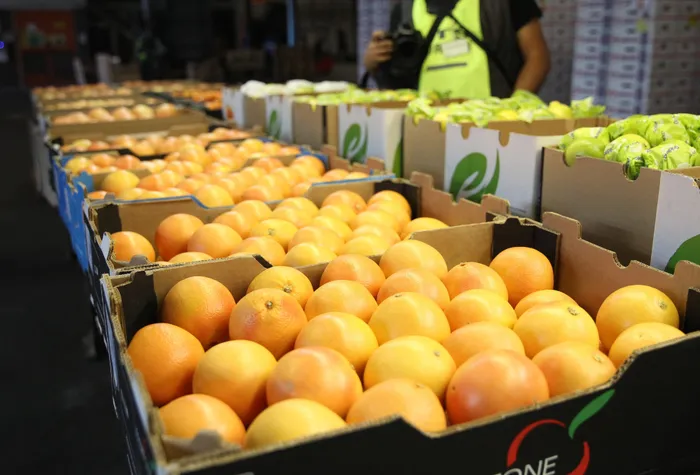South Africa braces for hefty 30% export tariff from the US

South Africa will be hit with a 30% tariff on all its exports to the United States from August 1, following a formal letter from US President Donald Trump to President Cyril Ramaphosa demanding action on trade imbalances and long-standing market restrictions.
Image: Lee Rondganger/IOL
South Africans are bracing themselves for the ramifications of the hefty 30% export tariff to the US that is expected to come into effect on Friday.
South Africa exports billions of rands’ worth of goods to the US each year, including fruit, vegetables, meat, and wine.
These sectors employ thousands of workers, and the 30% tariff will render their products uncompetitive in the American market, placing immense pressure on producers and exporters.
South Africa has been trying to negotiate a trade deal with the US since May but is yet to agree on terms.

The US tariffs are a stress test for South Africa’s economic resiliency.
Image: Doctor Ngcobo / Independent Newspapers
The Department of Trade, Industry and Competition (DTIC) said it remains committed to the cause and awaits substantive feedback from the US on the final status of the country’s framework deal.
The department said it has been in a period of intense negotiations with the US and had signed a condition precedent document and “have readied our inputs for entry into the template which is to follow from the US”.
“Despite the challenges that have been presented by this period, we have put our best foot forward, bringing together the subject specialists within our ranks that have dug deep to ensure that our country is adequately prepared for a number of potential scenarios,” DTIC said.
According to estimates, the tariffs will add roughly $3.5 billion (R63bn) to the cost of exports to the US, based on South Africa’s 2023 export value.
The DTIC’s proposed deal features a number of areas, including importing 750-100 petajoules of Liquified Natural Gas for a 10 year period, unlocking $12 billion; and enabling agricultural market access by simplifying US poultry exports under the 2016 tariff rate quota and unlocking approximately $91m million in trade.
South African firms committed to invest $3.3bn in US industries such as mining and metals recycling, while both governments agreed to pursue joint investment in critical minerals, pharmaceuticals and agri-machinery.
Thys van Zyl, CEO of Everest Wealth Advisory, said South Africa was facing severe economic consequences without any formal agreement in place with its second-largest bilateral trading partner.
“It is almost unthinkable that, on the eve of such far-reaching tariffs, we still do not have a formal agreement – or even a timeline for when one can be expected. This is not only deeply concerning – it is negligent,” Van Zyl said.
Despite discussions between the relevant stakeholders, there are no confirmed exemptions, no concessions, and no sign of progress in negotiations with the US government.
The government has denied claims of a trade imbalance between South Africa and the US, maintaining that the 30% reciprocal tariff was not an accurate representation of available trade data.
Minister of Trade, Industry and Competition, Parks Tau, this week said they were working with other government departments on a response plan that also focuses on demand side interventions in the impacted industries.
Meanwhile, Foord Asset Management portfolio manager Farzana Bayat said a 30% tariff wall on South African exports to the US would be catastrophic and escalate trade risk.
“That would be a seismic shock. Even traditional US allies like the EU and Japan have negotiated reduced 15% tariffs - South Africa may not be so lucky,” Bayat said.
She said the stakes were high as the expiry of the African Growth and Opportunity Act in 2025 was already clouding the medium-term trade outlook.
Bayat said the immediate risk was acute as the South African Reserve Bank Governor Lesetja Kganyago recently warned that up to 100 000 jobs were at risk, and the automotive and citrus industries were especially exposed.
Car exports to the US have already collapsed by more than 80% due to earlier tariff pressures.
“This economic stress comes at a time when South Africa is already contending with low growth, power insecurity, and shaky investor confidence,” Bayat said.
“Losing preferential access to the US - our third-largest trading partner - could be devastating.”
Get your news on the go, click here to join the Cape Argus News WhatsApp channel.
Cape Argus